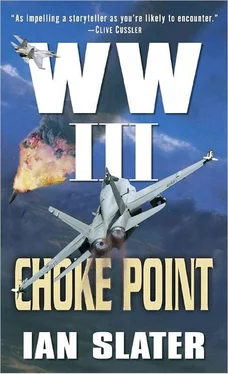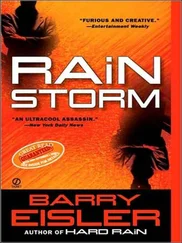Freeman was understandably tight-jawed as they hauled in the third of the six bodies. “Look,” he said sternly. “No identification!”
Aussie wondered if the general’s cryptic comment was a criticism of the dead men for not having identified themselves before opening fire, or whether he was commenting on the fact that none of those hauled in so far had any ID whatsoever. One of them looked Central Asian to him, another Chinese, and the third was racially unidentifiable, having been hit in the upper chest and face.
“Where in hell did they come from?” asked Salvini. “I mean, were they sent from the sub to run interference?”
“Maybe they came out of that cave,” said Choir.
“I’ll bet—” Aussie began, and paused for breath as he braced his feet against the inside of the tin boat’s starboard drop seat and, aided by Freeman, began hauling in the fourth floater. “—I’ll bet Choir’s right, that these pricks are the same ones who did the sicko job on young Dixon. Probably came down out of the cave then dragged their RIB from a hide on the beach and came out in the fog to do the Petrel ’fore she could find their mates in the sub.” The fourth floater, another Asian, now tumbled into the boat, which rocked precariously.
“Watch it!” cautioned Choir. “I’ve had enough dunking for one day.” He added, “Why not let Petrel haul these shit bags out?”
No one answered his question, but their silence was a reply. Their earlier guesstimates notwithstanding, they were not sure whether these bodies were hostiles or U.S. Special Forces like themselves, caught up in a tragic blue on blue. Aussie’s hypothesis that the bodies were those of the hostiles who so savagely murdered and tortured Dixon was no more than that — a hypothesis. Special Forces, like Freeman’s, like David Brentwood’s failed team in Afghanistan, always went on foreign operations without any identification that might cause political embarrassment should they be captured or killed. And the fact that two different branches of the armed services often sent out their own without telling one another was no help. Plus, as Choir acknowledged, foreign terrorists teams would certainly use someone fluent in English.
“What’s this one?” Aussie asked as they hauled in another body. “Chinese?”
“No,” said Freeman.
“Japanese?” proffered Choir.
“Vietnamese?” suggested Aussie. “They’re heavy as a brick in the water, but you can see they’re all in pretty good shape. No extra weight. Damn, look at that! Fog’s rolling in again.” It came in like a giant billow of smoke, and within a minute the Petrel and the Skate , each vessel’s radar allowing them to maintain station two hundred yards apart, were at times completely hidden from view. With the sixth body nowhere to be seen, Choir sped up the Mercury before they lost sight of Petrel .
Unintentionally, just as Petrel ’s and Skate ’s engineers had done, he further sabotaged Petrel ’s side-scan outgoing sonar waves. Not surprisingly, the disturbance angered Hall, who, as tired as everyone else on the oceanographic vessel, now learned from the Skate ’s captain that the five unidentified dead men killed by Freeman had definitely not been sent from the Skate .
This told Frank that the six-man commando unit sent so cunningly to board Petrel would not have been dispatched unless the sub was still in the area, lying low. “Mate,” he ordered the first officer, “get the GPS coordinates for that slab we had a trace of a while back. GPS, as good as it is, has a possible error margin of a hundred feet. That’s not much on land, but out here it can be like looking for your car on the wrong parking level and—”
“Like the Seinfeld show,” said the mate, “when Kramer—”
“I don’t watch TV,” Frank cut in abruptly. “Take your steering directions from the dry lab. I’ll stay down here.”
“Sir?”
“Yes?
“I have to take a dump!”
“Where’s the third mate?”
“Feeling sick. She’s pretty upset.”
“About what?”
“Well, you know,” began the mate awkwardly. “She told me she signed on to do, you know, retrieval, oceanographic work, not a war. Guess she wasn’t ready for this?” He indicated the bodies being hauled up from the tin boat by the stern’s hydraulic arm.
“New York wasn’t ready for 9/11,” retorted Frank, punching the intercom bar for the third mate’s cabin.
A groggy, sickly voice barely managed to say, “Yes?”
“Riley. It’s the captain speaking. Get your ass up to the bridge. Now! ”
The third mate’s silence was a tacit recognition of Hall’s zero tolerance for malingerers, Frank telling her everyone on the ship was needed. If the fog kept socking them in, it would be an ideal opportunity for an injured sub awaiting its chance to make a run for it come nightfall.
When the third mate dragged herself up to relieve the first mate, she was whey-faced. A tall, lithe young woman who normally looked as if she could handle anything, her male counterparts could see that Sandra Riley looked bedraggled after her ordeal, dazed by the bridge glass’s reflection of the bright shaded stern light that formed a sharply defined cone in the swirling fog.
Frank, who had just come up from the dry lab, tapped the GPS coordinates on the chart. “Soon as we get those bodies aboard, Sandra, we’ll come about and backtrack to this GPS location. See what we get in the trace. We lost a gob of it during a damn paper change.”
Sandra took Hall’s use of her first name as a good sign — more often than not he simply called her Riley. “If it’s the sub,” she mused aloud, “maybe they’ll take advantage of all this noise.”
Frank’s usual equanimity was edgy with fatigue. “You an authority on antisubmarine warfare now?” He knew better, but the perversity that runs with bad temper and the feeling of his own impotence regarding the sub was venting itself.
“I just meant that with all the noise the Skate ’s engines are making, screwing up our side scan, it would be a good time for a sub in trouble to surface—”
“Yes, I know. Make a run for it in the fog.”
“Exactly!” It was said in a gutsy, uncompromising tone.
Frank turned to watch the work crew bringing aboard the general and his three comrades, all of them old friends who’d trained at one time or another in SpecOps at Elgin in Florida as well as at the SEALs’ school at Coronado in California. They’d all carried the monstrous logs at Coronado, running along the public beach while young beach beauties Sandra’s age, only a few feet away, sunbathed in the scantiest thong bikinis the sweating, grunting SEAL trainees had ever seen. “What beauties?” the SEALs’ instructors had barked, their faces masks of incredulity. “Ain’t no women here. You’re hallucinating. Pick it up, Salvini. Hup, two, three …”
Frank made a mental note to apologize to Sandra later. But now, her self-assertiveness, her tone, which some skippers could easily have convinced themselves was bordering on insubordination, was too recent for him to humble himself. It was a trait which he did not admire in himself. “We’ll need to be right on the spot,” he continued, businesslike. “We spotted a slablike shape against a slope. Unless we’re on the southern side of it, our scan’ll miss it — the sandy slope’ll wall it off from us.”
“I understand, sir.”
“Very well. I’ll be down in the lab. Once we’re there, I’ll give you helm instructions from the lab.”
“Very well.”
Very well . Was she sticking it to him?
He saw Freeman, who entered the dry lab, strode over, and shook hands vigorously. “Good to see you, Frank! I need room for my men to rest. That goddamn sub is still here. I know it. Get that Coast Guard ship to do a search grid, but no overlap with yours. Can’t afford to waste time.”
Читать дальше












